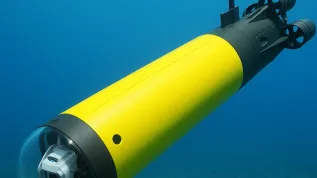
A doctoral student will initially receive approx. PLN 2,000 later PLN 3,000 net. While receiving the scholarship, doctoral students will not be allowed to be employed at the university. Deputy Minister of Science Piotr Müller talks about the changes that young scientists can expect after the university reform.
PAP: The government approved the higher education and science bill in March. What is the possible schedule of further work on the bill?
Piotr Müller, Deputy Minister of Science and Higher Education: The project will now be processed by the parliament. We would like the law to be presented to the President for signature in late May or early June.
In April and May we will present the most important regulations related to the law for public consultation - including regulations concerning the principles of evaluation of research and division of disciplines. We want to publish these important regulations as soon as the law appears in the Journal of Laws, which we hope will happen in June.
PAP: The ministry announced that it wanted a public hearing to be held in the Sejm.
P.M.: Only one session of the Sejm is planned in April and one in May. Out of concern for the project to come into force as soon as possible, we are considering abandoning the idea of public hearing. The process of creating the law was much broader than the public hearing itself. The social dialogue element has been fulfilled.
PAP: The Ministry assured many times that the project was created also for the benefit of young scientists. What will change in their favour?
P.M.: These changes will include the establishment of doctoral colleges in 2019 and the introduction of general doctoral scholarship for PhD students. In the first two years, doctoral scholarship will amount to at least 37 percent the professor`s minimum wage, and in the third and fourth year of the doctoral college the scholarship will amount to 57 percent of the professor`s wage. We assume that these amounts will be approx. PLN 2,000 and 3,000 PLN net, respectively.
In addition, people in doctoral colleges will have an opportunity to go on parental leave. This option was not available until now.
PAP: How will doctoral colleges be different from doctoral studies?
P.M.: Doctoral colleges will be interdisciplinary - created by universities in at least two disciplines. If someone wants to do a doctorate in sociology, that person will attend a doctoral college in the field of sociology and in another, additional discipline, for example psychology. The idea is that different disciplines should intersect in the framework of education and doctoral students should learn about different research methodologies.
PAP: What will doctoral student`s life in a doctoral college look like? Will doctoral students still attend classes and teach students?
P.M.: We do not regulate that at the level of the law. This is a matter of university decisions. Doctoral students will carry out teaching activities with students only as part of practical training. Universities will not be permitted to employ their doctoral students to teach classes. We do not want PhD students to be substitutes for university teachers. They should focus on conducting research and working on their doctoral dissertations.
But they may give up the doctoral scholarship if at some stage they decide to work during their education in a doctoral college. It is a flexible model. We do not want to close the road to stabilization in the form of employment under a contract of employment, but in the case of receiving a scholarship, such employment will not be possible.
PAP: What else will change for young scientists?
P.M.: We are changing the definition of a young scientist. It will not be based on the record age, but on the number of years since obtaining the doctoral degree. So the determining factor will not be age, but career start time.
PAP: Will there be changes in the promotion paths that will help young researchers?
P.M.: It sometimes happened at universities that researchers were discouraged from applying for habilitation, because it was too early for promotion and it would not be perceived well at the university. We want to change that. Habilitation will determine promotion, scientific achievements will. A PhD will open most paths in an academic career.
In addition, we are introducing a mechanism that will allow winners of prestigious ERC grants or other prestigious international grants to automatically obtain habilitation. We imagine that this will also apply to the winners of important National Science Centre grants.
PAP: What exactly will the degree of habilitated doctor be needed for?
P.M.: A habilitated doctor will be able to be a promoter or reviewer in doctoral or postdoctoral proceedings. Holders of this title will also be eligible to obtain the title of professor. But these are actually all the additional benefits.
For example, we will eliminate staffing minima. Until now, to retain the right to award academic degrees, university had to employ a certain number of habilitated doctors and professors. As a result, universities sometimes employed retired professors, even the ones who had not conducted any scientific or didactic activity for many years. We are doing away with this principle and give a new space to young employees. If they conduct better research and teaching activity, they will be able to take the place of people who have been blocking their promotion space.
PAP: Does the Ministry of Science expect personnel shuffles at universities?
P.M.: There will definitely be shuffles, but professors and habilitated doctors who have current scientific or didactic achievements have nothing to fear. Universities will want to employ such people, because they can be promoters of doctorates. But the time will end when people with the degree of habilitated doctor or professor have a guarantee of employment due to the necessity to fill the staffing minimum, in spite of the lack of scientific activity.
PAP: The Ministry of Science considered introducing a state of rest for professors. What happened to this idea?
P.M.: We have shelved it for now because there is no money for it. It is more important to guarantee salary increases for university employees.
But there is one more thing. In the project, we have abolished the system of appointing academic teachers. Until now, when someone passed a certain stage of professional promotion (...) that person could be employed on the basis of appointment, for example, until the age of 67, and in the case of professors until the age of 70. Until then such person`s contract was virtually impossible to terminate - except for the cases specified in the law. When the age was reached and pension entitlements were granted, it was terminated automatically and the employee retired. We are considering returning to - or rather maintaining - this system. We are considering tools that would allow universities to have flexible personnel policy and ensure staff exchange. If the system of appointments doesn`t exist anymore, the question arises as to whether the university will have the instruments to persuade an 80 years old professor to retire.
Interview by Ludwika Tomala
PAP - Science in Poland
lt/ ekr/ kap/
tr. RL













